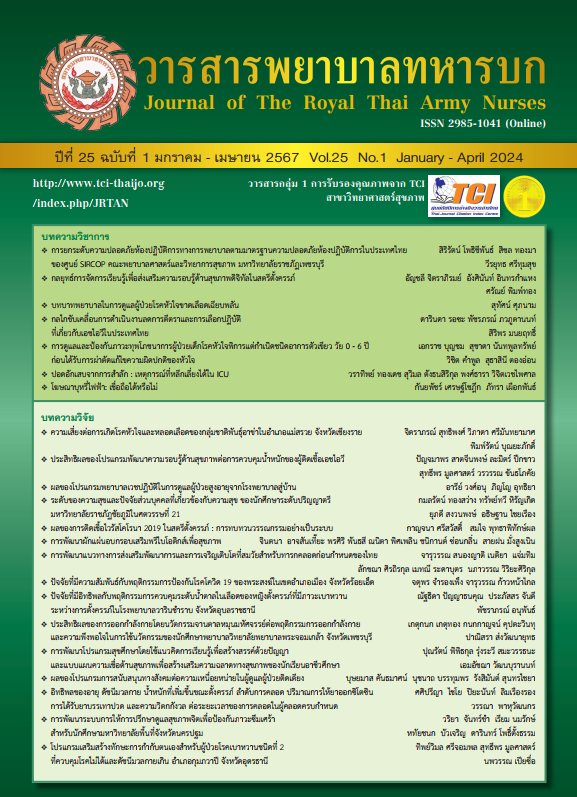The Effectiveness of a Self-regulation Skill Enhancement Program for Uncontrolled Type 2 Diabetes Patients with Overweight Body Mass Index in Kumphawapi District, Udon Thani Province
Keywords:
Self-regulation, Disease controlling behavior, Diabetes, Body mass indexAbstract
This quasi-experimental research was a two-group pretest-posttest design. The purposes of the research were to study the effects of a self-regulation skill enhancement program on the perception of self-efficacy in diabetes control, diabetes control behavior, body mass index (BMI), waistline, and blood glucose level among uncontrolled type 2 diabetes patients with overweight BMI. The sample was selected by random sampling and group of 32 people each. Research instruments were 1) a self-regulation enhancement program and handbook based on the theory of Bandura’s self-regulation theory. The 10-week activities comprised workshops and home visits; 2) questionnaires on diabetes control self-efficacy and behavior. The content validity index of both questionnaires was 1.00. Cronbach’s alpha coefficients were .91 and .92, respectively. Data were analyzed by descriptive statistics and a t-test. The result showed that after enrolling in the program, the self-efficacy and behavioral diabetes control of the experimental group were more than before enrolling in the program, and more than the comparative group, to a statistically significant degree at p-value < .05. Mean BMI, waistline, and blood sugar of the experimental group were less than before enrolling in the program, and less than the comparative group, at p-value < .05.
Downloads
References
World Health Organization. World health statistics 2017. France: [publisher unknown]; 2017.
Diabetes Association of Thailand under The Patronage of Her Royal Highness Princess Maha Chakri Sirindhorn. Clinical practice guideline for diabetes 2017. 3rd ed. Pathum Thani: Romyen Media Company; 2017. (in Thai)
Division of Non-Communicable Diseases, Department of Disease Control, Ministry of Public Health. NCDs situation report. Bangkok: Aksorn Graphic and Design Publishing Limited Partnership; 2020. (in Thai)
Mangklakeeree N., Senachai N., Panput A. Diabetes management in working age group: The challenging for nurse practitioners. The Journal of The Royal Thai Army Nurses. 2021; 22(3): 19-27. (in Thai)
Klongdee K., Benjakul S., Kengganpanich M., Kengganpanich T. Effects of the smart diet program applying the concept of selfregulation for diabetes control in type 2 diabetic patients. Rama Nurse Journal. 2019; 25(3): 326-39. (in Thai)
Poorat J., Pichayapinyo P., Lagampan S. Effects of self-regulation program on glycemic control in patients with uncontrolled type 2 diabetes. Kuakarun Journal of Nursing. 2020; 27(1): 20-33. (in Thai)
Baiphimai J., Leelukkanaveera Y., Srisuriyawet R. The effects of self-regulation by clinial information program to glycemic control behaviors score and glycosyted hemoglobin level on uncontrolled type 2 diabetes. Journal of Public Health Nursing. 2017; 31(3): 123-43. (in Thai)
Homchui P., Wanaratvijid C., Pratoomsoot C. Effect of self-management support for self-care behavior and blood glucose level in patients with type 2 diabetes mellitus. Boromarajonani College of Nursing, Uttaradit Journal. 2020; 12(1): 240-54 (in Thai)
Panyalert S., Imamee N., Kriengkaisakda W. Self-regalation to promote dietary and exercise behaviors of type 2 diabetic patients of Ban-Nongchado sub-district Healh Promoting hospital, Suphanburi province. Journal of Health Education. 2017; 40(1): 69-81. (in Thai)
Bandura, A. Social Cognitive Theory of SelfRegulation. Organizational behavior and human decision processes. 1991; 50(2): 248-87.
Phanphrom P., Rodjakpai Y., Wirutsettasin K. The results of The weight-control program on applying the concept of self-regulation towards body mass index of people with overweight in Bothong district, Chonburi province. Journal of Public Health Nursing. 2017; 31(1): 46-59. (in Thai)
Suksan N, Kespichayawattana J. Effects of promotion self-regulation program on eating behaviors and waist circumference in older patients with obese diabetes. Royal Thai Navy Medical Journal. 2017; 44(3): 85-102. (in Thai)
Silfee, V., Petosa, R., Laurent, D., Schaub, T., Focht, B. Effect of a behavioral intervention on dimensions of self-regulation and physical activity among overweight and obese adults with type 2 diabetes: a pilot study. Psychology, Health & Medicine. 2016; 21(6): 715-23.
Thongpootorn P., Lowirakorn S. Food consumption of diabetic patients with uncontrolled plasma glucose level at diabetic clinic, Kutchap hospital, Udon Thani province. Khon Kaen University Journal for Public Health Research. 2020; 13(1): 22-32. (in Thai)
Peeke, P., Greenway, F., Billes, S., Zhang, D., Fujioka, K. Effect of time restricted eating on body weight and fasting glucose in participants with obesity: results of a randomized, controlled, virtual clinical trial. Peeke et al. Nutrition and Diabetes. 2022: 11(6): 1-11.
Thipkratok S., Phatisena T. Effects of selfmanagement program for health behavior modification, body mass index and waist circumference among village health volunteers with abdominal obesity. Regional Health Promotion Center 9 Journal. 2020; 14(34): 210-23. (in Thai)
Downloads
Published
How to Cite
Issue
Section
License

This work is licensed under a Creative Commons Attribution-NonCommercial-NoDerivatives 4.0 International License.
บทความหรือข้อคิดเห็นใดใดที่ปรากฏในวารสารพยาบาลทหารบกเป็นวรรณกรรมของผู้เขียน ซึ่งบรรณาธิการหรือสมาคมพยาบาลทหารบก ไม่จำเป็นต้องเห็นด้วย
บทความที่ได้รับการตีพิมพ์เป็นลิขสิทธิ์ของวารสารพยาบาลทหารบก
The ideas and opinions expressed in the Journal of The Royal Thai Army Nurses are those of the authors and not necessarily those
of the editor or Royal Thai Army Nurses Association.






